Bahá’í Community News
Regional Conferences of the Five Year Plan
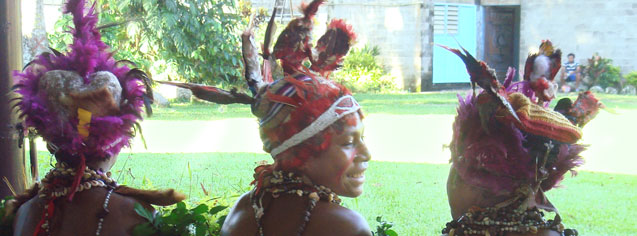 Friends from the Papua New Guinea highlands wear traditional costumes. More photographs
Friends from the Papua New Guinea highlands wear traditional costumes. More photographsand video
The Lae Regional Conference
17–18 January 2009
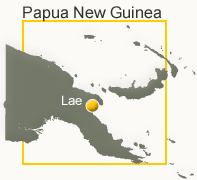
From every corner of Papua New Guinea, the Baha’is came – and that was not easy. In Rabaul on the island of New Britain, the long-threatening volcano was acting up, requiring Baha’is who wanted to attend the conference to be ferried out by helicopter to a landing spot where they could then catch a boat or plane to the city of Lae on the main island of New Guinea.
Boats to Lae had their problems, too. One group of travelers was almost stranded when their craft blew its engine. Similar challenges were experienced by some of those who traveled by bus. Others walked long distances – up to a week – to attend the regional conference convened by the Universal House of Justice.
But at 8 a.m. sharp on 17 January, right on schedule, the gathering got under way with devotions offered by the children, youth, and adults of the Gazelle Peninsula on New Britain island. Joining the Baha’is from the host nation was a small band of believers from the Solomon Islands to the east, as well as visitors from Australia, Kenya, and the United Kingdom.
“I have never attended a conference like this and I learnt a lot. I will go home and share with my friends and the believers from my cluster the stories of this wonderful conference.”
Sawato Kiyapa, 26 - Gogodala Cluster, Papua New Guinea
Attending as representatives of the Universal House of Justice were Stephen Hall and Zenaida Ramirez, both members of the International Teaching Centre. Also at the conference were eight members of the National Spiritual Assembly of the Baha’is of Papua New Guinea, three members of the National Spiritual Assembly of the Baha’is of the Solomon Islands, and two members of the Continental Board of Counselors.
The final attendance figure was just over 1,500 people, about three times the initial expectation and the largest assemblage of Baha’is ever to gather in Papua New Guinea. The gathering overflowed the 700-seat auditorium at the University of Technology, an institution which helped out by purchasing large-screen monitors for viewing the proceedings from the foyer and a grassy area outdoors.
The conference begins
Mrs. Ramirez gave the opening address, and there were also presentations by the national assemblies of Papua New Guinea and the Solomon Islands – reports that provided a vivid description of how the processes of current Baha’i activities are leading both to growth and the transformation of community life.
“The friends responded enthusiastically to the opening address and despite the oppressive heat – it is amazingly hot! – they concentrated on every word,” wrote one conference participant.
The afternoon session brought presentations on the central concepts of the current Five Year Plan, enriched by the sharing of experiences from various communities. One story told of a Baha’i who went to live in a new area and, despite many obstacles, was instrumental in establishing an intensive program of growth. Another, from the Solomon Islands, noted the value of building trust and confidence with participants in junior youth classes and their parents.
Vera, from the Gogodala area of Papua New Guinea, told how children’s classes have multiplied in recent years, particularly when people began studying the curriculum of the Ruhi Institute – material and activities which, she said, help increase capacity and confidence to initiate such classes. At one point, teachers were identified in each of the communities and traveled to an intensive training, after which they returned home and were able to start up additional classes. “My experience in the past year made me realize that these Baha'i children's classes have assisted us to launch our intensive program of growth,” she said.
Cultural evening
Saturday evening’s program was a celebration, through artistic and cultural presentations, of the impact that Baha’i activities have had on individuals and communities. Highlights of the program included the following:
-
Children and young people from the East New Britain Province of Papua New Guinea presented a drama on the functioning of the junior youth groups and showed how they promote other areas of service, particularly the establishment of children’s classes. One child told how he liked going to classes because it made his parents happy, and also how his father now enjoyed participating in study circles.
-
Youth and adults from the Milne Bay Province of Papua New Guinea beautifully chanted a tablet by ‘Abdu’l-Baha and then presented a simple yet poignant mime on the importance of the core activities to the life and vitality of the community.
-
A group from the Siane region of the highlands of Papua New Guinea offered a performance involving the Asaro Mudmen, which they described as a warrior tribe of their region. Afterward they explained that the area historically has been plagued by tribal warfare, but the institute courses have helped create unity and brought together people from diverse backgrounds. The group presented a gift – an intricately crafted clay mask – to the Universal House of Justice as a mark of gratitude for the conference.
-
Representatives from the Oro Province performed a traditional dance and then presented beautiful bark cloth paintings adorned with a Baha’i emblem and the words “Oro oro oro” (“Welcome welcome welcome”).
The presentations went late in to the evening, with many of the friends staying up much later, singing songs and sharing stories of the activities in their villages and towns.
The Sunday sessions
Sunday was dedicated to planning future action. People divided into groups to consult on plans for specific communities, reflecting on what they have learned so far and developing collective and individual plans of action. Afterwards, participants made specific commitments, with more than 1,000 individual offers tallied – 150 people saying they would travel to another community to assist in some way, 119 offering to start a new study circle in their home, 248 pledging to initiate a children’s class or junior youth group, 226 to complete another book in the curriculum offered by the Ruhi Institute, and 319 to host devotional meetings and conduct home visits.
“The effect of this conference is that it has made me want to return home immediately to carry out the work of the Faith.”
Tebano Bobai - Solomon Islands
The consultations also led to new, more ambitious plans for Lae and Port Moresby, the largest urban clusters in Papua New Guinea.
The reporting of all these commitments and plans led to the conference culminating on a high note, with participants asked to take one step within 24 to 48 hours to fulfill their pledges.
A bonus of the gathering was the launching on Saturday evening of the new Web site of the Baha’i community of Papua New Guinea. The designer, Naser Kaviani, expressed how miraculous it was that the completion of the Web site, a project of the National Spiritual Assembly for many years, could coincide with such a momentous conference. Mr. Kaviani dedicated the launch of the Web site to the Baha’is of Iran.
Comments from participants
Sawato Kiyapa, 26, Gogodala Cluster, Papua New Guinea: “I have never attended a conference like this and I learnt a lot. I will go home and share with my friends and the believers from my cluster the stories of this wonderful conference.”
Patrick Reoka, 30, Solomon Islands: “The whole culture of growth amazed me, mesmerized me, … how it is operating in the region.”
Nickson Corrie, 42, Western Highlands Province, Papua New Guinea: “This conference has taught me that we have to conduct all of the acts of service throughout Papua New Guinea.”
Tebano Bobai, Solomon Islands: “The effect of this conference is that it has made me want to return home immediately to carry out the work of the Faith. The presentations were all so clear and uplifting.”
Ian Michael, Kora, Western Highlands, Papua New Guinea: “I was so impressed to see so many diverse Baha’is coming from all over Papua New Guinea. When I go home from this conference I will encourage more of my friends to attend the junior youth programs with me….”
Jalal Mills, Papua New Guinea: “We're having to learn to deal with the challenges of growth because before we never had to deal with these kinds of numbers.”
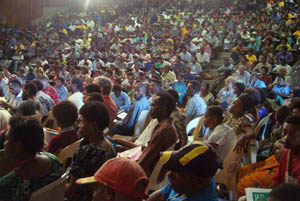
All but a handful of the 1,500 participants were from Papua New Guinea. A small group came from the Solomon Islands.
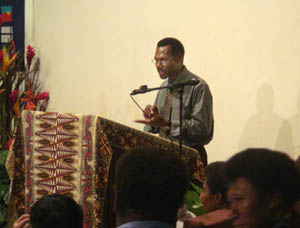
Patrick Metta of the National Spiritual Assembly of the Baha’is of Papua New Guinea, addresses the conference.
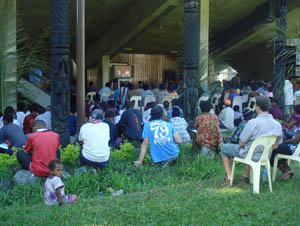
The overflow crowd watches proceedings via a video hookup from outdoors.
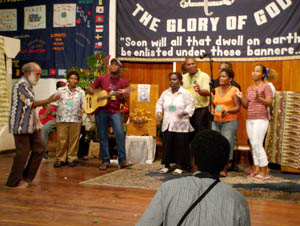
Solomon Islanders perform on Saturday evening.

Baha’is from the Oro Province of Papua New Guinea present bark-cloth paintings. “Oro oro oro” means “Welcome welcome welcome.”
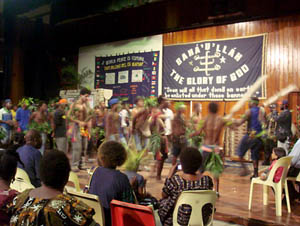
Participants from Kimbe cluster perform onstage.
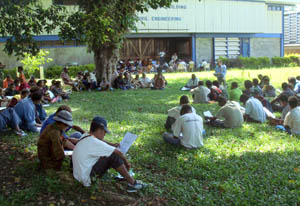
People read one of the letters from the Universal House of Justice.
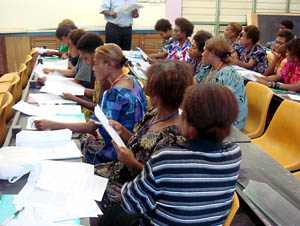
Breakout sessions provide opportunity for consultation about activities in specific communities.
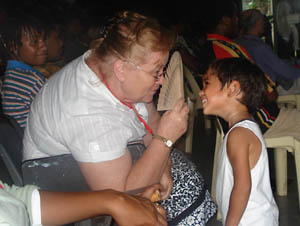
The conference was a time to make and solidify friendships.
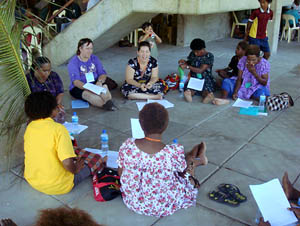
The weather was hot in Lae, but it didn’t seem to affect anyone’s enthusiasm for studying and reflecting.
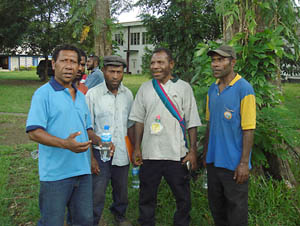
A group Asaro Mudmen – a tribe known traditionally for its warring ways – told how community-building efforts in their region had begun creating a feeling of unity among various groups.
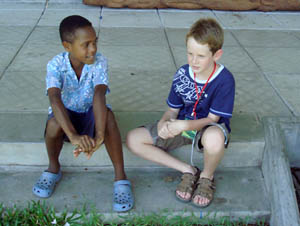
Another friendship being made or nurtured …
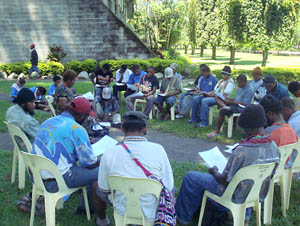
A number of the participants had never traveled before to Lae, the second-largest city of Papua New Guinea after Port Moresby.
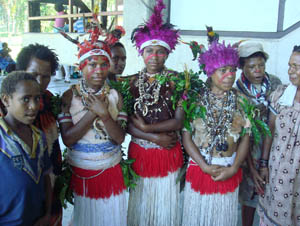
Young people from the highlands of Papua New Guinea donned ceremonial costume for the conference.
Video: Clips of interviews and music from the conference.













